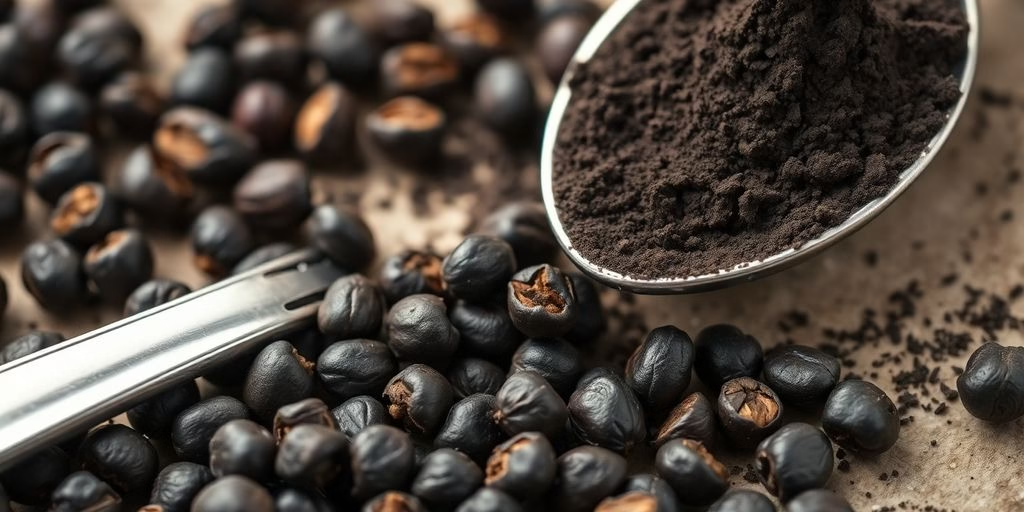Book Appointment Now

The One Kitchen Spice That Melts Belly Fat While You Sleep: Doctor’s Surprising Advice
You know, it’s easy to get caught up in all the diet fads out there. But what if I told you that something as simple as a common kitchen spice could actually help you shed some of that stubborn belly fat, even while you’re catching some Zs? It sounds a bit wild, right? Well, a doctor shared some really interesting advice about this, and it turns out, nature might have a few tricks up its sleeve when it comes to weight management. We’re talking about spices you probably already have in your pantry. Let’s take a peek at what this doctor had to say about The One Kitchen Spice That Melts Belly Fat While You Sleep (Doctor’s Advice).
Key Takeaways
- Certain spices like turmeric and cayenne pepper may support metabolism and help burn more calories.
- Spices such as cinnamon and fenugreek can help manage appetite and reduce cravings, which is key for weight control.
- Turmeric’s active compound, curcumin, has anti-inflammatory properties that might help with insulin resistance and weight gain.
- Ginger and black pepper contain compounds that could aid digestion and potentially boost fat loss, though more human studies are needed.
- Incorporating these spices into your diet, alongside healthy eating and exercise, could be a simple way to support your weight management goals.
The One Kitchen Spice That Melts Belly Fat While You Sleep
It sounds too good to be true, right? A simple spice from your kitchen cabinet that can help you shed those stubborn pounds while you’re catching some Z’s. Well, science is starting to back up what many have suspected for a long time: certain spices aren’t just for flavor, they can actually play a role in your weight management journey. It’s not magic, but it’s pretty close.
Understanding the Science Behind Fat Burning Spices
So, how does this work? It all comes down to how our bodies process food and store fat. Some spices have compounds that can give your metabolism a little nudge, helping you burn more calories. Others can help you feel fuller for longer, which means you’re less likely to overeat. It’s about working with your body, not against it.
How Certain Spices Support Metabolism
Metabolism is basically your body’s engine. The faster it runs, the more calories you burn. Certain spices, like cayenne pepper, contain a compound called capsaicin. This stuff can actually increase your body temperature slightly, which in turn burns more calories. Think of it as a tiny, natural boost to your internal furnace. Other spices might influence hormones that regulate how your body stores fat.
The Role of Spices in Appetite Control
One of the biggest hurdles in losing weight is managing hunger. Spices can be surprisingly effective here. Cinnamon, for example, can help stabilize your blood sugar levels. When your blood sugar is steady, you’re less prone to those energy crashes that lead to cravings for sugary snacks. Fenugreek is another one that studies suggest can help reduce how much food you eat. It’s all about feeling satisfied with less.
Here’s a quick look at some of the top contenders:
- Turmeric: Known for its anti-inflammatory properties, thanks to curcumin.
- Cayenne Pepper: Contains capsaicin, which may boost calorie burning.
- Ginger: Can help with digestion and has been linked to reduced body weight.
- Cinnamon: Helps manage blood sugar, potentially reducing cravings.
- Fenugreek: May help control appetite and reduce food intake.
- Black Pepper: Contains piperine, which is being studied for its fat-burning potential.
It’s important to remember that while these spices can be helpful allies, they aren’t a magic bullet. They work best when combined with a balanced diet and regular physical activity. Think of them as a supportive addition to an already healthy lifestyle.
Incorporating these spices into your evening routine could be a simple way to support your weight loss goals. For instance, a warm cup of turmeric or ginger tea before bed might be just the thing. You can also add them to your dinner meals. Remember, consistency is key, and even small changes can add up over time. For more on how spices can aid your health, check out this information on ginger and weight loss.
Turmeric’s Powerful Anti-Inflammatory Properties
Turmeric, that bright yellow spice you see in curries and golden lattes, isn’t just for flavor and color. It’s packed with compounds that can really help your body out, especially when it comes to fighting inflammation. And guess what? Less inflammation can actually help with weight management.
Curcumin: The Key Compound in Turmeric
Most of turmeric’s health perks come from a substance called curcumin. It’s what gives turmeric its signature color and a lot of its medicinal punch. Think of curcumin as the main player in turmeric’s health benefits. Studies suggest it can help reduce inflammation throughout your body. When your body is less inflamed, it can function better overall, and this might play a role in how your body handles fat.
How Turmeric Aids in Curbing Insulin Resistance
Insulin resistance is a big deal when it comes to weight gain, especially around the belly. It’s when your body’s cells don’t respond well to insulin, leading to higher blood sugar levels. Turmeric, thanks to curcumin, might help improve how your body uses insulin. By reducing inflammation, which is linked to insulin resistance, turmeric could help your body manage blood sugar more effectively. This can prevent those sugar spikes that often lead to storing extra fat.
Incorporating Turmeric into Your Evening Routine
Adding turmeric to your diet is pretty simple. You don’t need a lot to potentially see benefits. For an evening routine, consider a warm cup of “golden milk.” It’s usually made with milk (dairy or non-dairy), a bit of turmeric, maybe some ginger and cinnamon, and a touch of honey. It’s a comforting drink that can help you wind down before bed, and you get that dose of turmeric. Another idea is to add a pinch to warm water or herbal tea.
Here’s a simple way to make golden milk:
- 1 cup of your favorite milk (almond, oat, or dairy)
- 1/2 teaspoon ground turmeric
- A pinch of black pepper (helps with absorption)
- Optional: a dash of cinnamon, a tiny bit of ginger, and a drizzle of honey
Just warm the milk gently with the spices, stir well, and enjoy. It’s a soothing way to end the day.
Cayenne Pepper: Boosting Metabolism Naturally
Cayenne pepper, that fiery little spice, is more than just a way to add some kick to your meals. It’s got a secret weapon: capsaicin. This is the compound that gives cayenne its heat, and it turns out, it might also help your body burn more calories. Think of it as a gentle nudge to your metabolism, encouraging it to work a bit harder even when you’re just sitting around. Some studies suggest that capsaicin can increase the number of calories you burn throughout the day, which is pretty neat if you ask me.
Capsaicin’s Effect on Calorie Burning
So, how exactly does capsaicin work its magic? Well, it seems to ramp up your body’s heat production, a process called thermogenesis. When your body generates more heat, it uses up more energy, meaning more calories burned. It’s not a magic bullet, of course, but even a small boost can add up over time. It’s like giving your internal furnace a little extra fuel. This effect is subtle, but consistent use might contribute to a slightly higher daily calorie expenditure. It’s interesting to see how something so common can have these effects, and it makes you wonder what other kitchen staples might be doing for us without us even realizing it. For those looking into natural ways to support their weight management, exploring ingredients like cayenne pepper can be a part of a broader naturopathic medicine approach.
Reducing Hunger with Cayenne Pepper
Beyond just burning calories, cayenne pepper might also help you feel fuller for longer. Capsaicin has been linked to a reduction in hunger, which could mean you eat less overall. This is super helpful when you’re trying to manage your weight, as controlling your appetite is half the battle. While some research points to this effect, it’s worth noting that the exact mechanisms are still being explored. Some studies suggest the feeling of fullness might be partly due to how it affects your digestive system, rather than just hormonal changes. Still, if it helps you cut down on snacks between meals, that’s a win.
Potential Side Effects and Safe Consumption
Now, before you go overboard with the cayenne, a word of caution. Too much of a good thing can be, well, too much. Some people might experience stomach upset or heartburn, especially if they’re not used to spicy foods. It’s generally recommended to start small and see how your body reacts. A good rule of thumb is to stick to about a tablespoon of herbs and spices per day, and always pair them with nutritious foods. If you have any health conditions or are on medication, it’s always a smart move to chat with your doctor before making big changes to your diet, especially when considering supplements. Remember, consistency is key, but so is listening to your body.
Ginger: Aiding Digestion and Fat Loss
Ginger, that zesty root we often reach for in the kitchen, might be doing more for us than just adding a kick to our stir-fries. It turns out, this ancient spice has some pretty interesting connections to our digestive system and, believe it or not, to shedding a few extra pounds. It’s not magic, of course, but the way ginger interacts with our bodies could be a helpful piece of the weight management puzzle.
Ginger’s Impact on Body Weight and BMI
So, what’s the deal with ginger and weight? Some studies have looked into this, and the results are pretty encouraging. A big review that looked at a bunch of different studies found that taking ginger supplements seemed to help people lose a bit of weight. It wasn’t just about the number on the scale, either; it also appeared to lower body mass index (BMI) and reduce body fat percentage. Now, these studies often use concentrated amounts, like supplements, so just sprinkling a little ginger on your food might not have the same dramatic effect. Still, it suggests there’s something in ginger that’s beneficial for managing our weight.
Relaxing the Intestinal Tract with Ginger
Ever feel bloated or just generally uncomfortable after a meal? Ginger can be a real friend to your gut. It’s known for its ability to calm things down in your digestive system. Think of it like a gentle soothing agent for your insides. This can help with things like indigestion and that heavy feeling you sometimes get. When your digestion is working smoothly, your body can process food more efficiently, which is always a good thing when you’re trying to manage your weight. A happy gut often means a happier metabolism.
Synergistic Effects with Other Spices
Here’s where it gets really interesting. Ginger doesn’t have to work alone. It plays really well with other spices that are also thought to help with weight management. Imagine ginger teaming up with turmeric or cinnamon. They can create a sort of super-team effect. When you combine these spices, their individual benefits might actually multiply. This means that a blend of these warming spices could be more effective for boosting your metabolism and controlling your appetite than any one of them on its own. It’s like giving your body a little extra support from multiple angles, all working towards the same goal.
While ginger shows promise for digestive health and potentially aiding weight management, it’s important to remember it’s part of a larger picture. A balanced diet and regular activity are still the main players. Think of ginger as a helpful sidekick, not the star quarterback.
Cinnamon: Stabilizing Blood Sugar for Weight Management

Cinnamon, that warm, comforting spice we often associate with apple pie and cozy mornings, might just be a secret weapon in your weight management journey. It’s not just about the flavor, though; cinnamon has some pretty interesting effects on how your body handles sugar, which can play a big role in keeping those extra pounds at bay.
Mimicking Insulin’s Effects with Cinnamon
One of the coolest things about cinnamon is that a compound within it can actually act a bit like insulin. You know, that hormone your body uses to move sugar from your bloodstream into your cells for energy. When your cells are more responsive to insulin, it means your body doesn’t need to produce as much. This can help prevent blood sugar spikes and crashes, which often leave you feeling hungry and reaching for snacks. This improved insulin sensitivity is a key reason why cinnamon is linked to better metabolic health.
Slowing Carbohydrate Breakdown
Ever feel that energy slump after a carb-heavy meal? Cinnamon might help with that too. It seems to slow down the rate at which your digestive system breaks down carbohydrates. This means sugar enters your bloodstream more gradually, leading to more stable energy levels and less of a chance for your body to store those excess carbs as fat. It’s like putting the brakes on your sugar absorption.
Reducing Appetite and Hunger Cravings
Because cinnamon helps keep your blood sugar steady, it can also help keep your appetite in check. When your blood sugar levels are all over the place, it’s easy to feel constantly hungry. By stabilizing things, cinnamon can help you feel fuller for longer and reduce those nagging cravings, especially for sugary treats. This makes it easier to stick to a healthy eating plan without feeling deprived. Adding cinnamon to your morning oatmeal or your evening cinnamon water or tea is a simple way to start reaping these benefits.
Keeping your blood sugar levels stable is more than just good for preventing diabetes; it’s a foundational step for managing your weight effectively. When your body isn’t constantly dealing with sugar surges and drops, it’s less likely to store fat and more likely to use the energy it already has.
Fenugreek: Controlling Appetite and Waist Circumference
Fenugreek, a common spice from the legume family, might be a helpful addition if you’re looking to manage your appetite and potentially trim your waistline. It’s packed with fiber and antioxidants, which are great for overall health and can help clear out toxins. Some research suggests that fenugreek can play a role in reducing how much food you eat. It’s thought that this might be linked to how it affects certain hormones that control hunger.
Fenugreek’s Role in Reducing Food Intake
Studies have looked into how fenugreek affects appetite. The idea is that the fiber in fenugreek seeds absorbs water and expands in your stomach, making you feel fuller for longer. This can naturally lead to eating less at mealtimes. It’s a pretty simple mechanism, but it seems to work for many people.
Positive Effects on Waist Circumference
Beyond just eating less, some research has also pointed to fenugreek having a positive impact on waist circumference. This means it might help with reducing abdominal fat specifically. While more studies are always good, the initial findings are promising for those targeting belly fat.
Managing Leptin Levels for Appetite Control
One of the ways fenugreek might help control appetite is by influencing leptin. Leptin is a hormone that tells your brain when you’re full. Some animal studies suggest that fenugreek could help manage leptin levels, which in turn could help regulate your appetite and reduce cravings. It’s a complex system, but it shows how this humble spice could have a significant effect.
Black Pepper: The Hidden Fat-Burning Compound

When we talk about spices that might help with weight management, black pepper often gets overlooked. It’s just a common seasoning, right? Well, it turns out this everyday spice has a secret weapon: a compound called piperine. This is what gives black pepper its signature kick, but it might also be doing more for your body than you realize.
Piperine’s Potential in Weight Reduction
Piperine is the active compound in black pepper that researchers are looking at for its potential role in weight loss. Studies suggest it might influence how your body stores fat and even affect your metabolism. It’s pretty interesting to think that something so simple could have these effects.
Animal Studies on Piperine and Fat Loss
Much of the current research on piperine and weight loss has been done on animals. For instance, one study found that when rats were given piperine supplements, they experienced a reduction in body weight. This happened even when their food intake didn’t change. Another study on mice with obesity also showed similar positive results regarding fat loss. It seems like piperine might be able to interfere with the processes that lead to fat accumulation.
The Need for Human-Based Research
While the animal studies are promising, it’s important to remember that we need more research specifically on humans. What works for rats or mice doesn’t always translate directly to people. Scientists are still trying to figure out exactly how piperine affects human metabolism and fat burning. So, while adding black pepper to your meals is a healthy choice, we’re still waiting for definitive proof of its weight-loss powers in humans. It’s definitely a spice worth keeping an eye on as more studies come out, and it’s a great addition to a diet focused on whole foods.
It’s easy to think of spices as just flavor enhancers, but some, like black pepper, might offer more. The compound piperine is showing potential in early studies, though more human research is needed to confirm its effects on weight loss.
Final Thoughts on Spices and Weight Management
So, while no single spice is a magic bullet for melting belly fat overnight, incorporating things like cinnamon, ginger, or turmeric into your meals can be a helpful addition to a healthy lifestyle. Remember, these spices work best when they’re part of a balanced diet and regular exercise routine. Think of them as little helpers that can support your body’s natural processes. Always chat with your doctor before making big changes, especially if you have any health concerns or are on medication. Small, consistent changes are usually the most effective way to reach your wellness goals.
Frequently Asked Questions
Can spices really help me lose belly fat while I sleep?
While no single spice can magically melt belly fat overnight, certain spices like turmeric, cayenne pepper, ginger, cinnamon, fenugreek, and black pepper can support your weight loss journey. They help by boosting your metabolism, controlling your appetite, and reducing inflammation, which are all important for managing weight.
How does turmeric help with belly fat?
Turmeric contains a powerful compound called curcumin. Curcumin is known for its anti-inflammatory properties, which can help your body handle insulin better. When your body uses insulin well, it can help prevent extra sugar from turning into fat, especially around your belly.
What makes cayenne pepper good for weight loss?
Cayenne pepper has a substance called capsaicin. This is what makes it spicy! Capsaicin can give your metabolism a little boost, meaning you burn more calories. It might also make you feel less hungry, helping you eat less.
How does ginger help with weight and digestion?
Ginger can help calm your stomach and digestive system. Some studies suggest that eating more ginger is linked to lower body weight. It also has properties that can help reduce swelling in the body, which can be good for overall health and weight management.
Why is cinnamon good for managing weight?
Cinnamon is great for keeping your blood sugar levels steady. It can act a bit like insulin, helping your body use sugar for energy instead of storing it as fat. This can also make you feel less hungry and crave fewer sugary snacks.
How can fenugreek help control appetite and waist size?
Fenugreek seeds are packed with fiber and can help you feel fuller for longer, which means you might eat less. Some research also shows that fenugreek can help reduce your waist size and might help control the hormones that tell your body when you’re hungry.


